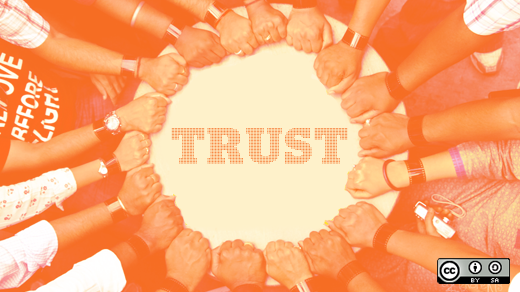In Japanese business discussions, one term appears again and again: "gemba." Over many years living and working for Japanese companies, I've probably heard the phrase "gemba de kimeru" a million times. Basically, it means that issues must be solved and decided on the front-line, where the problems and/or opportunities are. Popular thinking holds that people can work with their peers to solve problems. In Japan, however, problems with this thinking can develop.
Here, top managers often don't want to "stick out." They don't want to assume too much responsibility. So they pass decision-making "down" to front-line people, essentially removing themselves from the decision-making picture. They don't grant front-line employees decision-making power in order to empower them. They do it to avoid responsibility for failures.
As Jim Whitehurst says in The Open Organization, granting front-line employees more autonomy is a way of driving innovation—not avoiding culpability. Jim describes the ways Western managers struggle with the issue of autonomy (they fear letting their staff make decisions, as they think that by doing so they'll lose organizational power), but they miss this critical intercultural difference. (Interestingly, if managers stay involved in supporting roles and believe that front-line people can make decisions on their own, they can actually become more powerful. But that's another article.)
Managers should stay involved in critical decision-making, even as they grant their front-line employees a bigger voice in decisions. But their role needs to change. As Whitehurst says in The Open Organization, they need to facilitate, not delegate. That's a critical distinction that my time in Japan has taught me.
It's also shown me one source of this problem—as well as a few paths to fixing it.
In need of meritocracy
When managers ask their staff to make decisions, then divest completely from the decision-making process, they can actually reveal their own weaknesses. I've seen engineers transferred to high level, personnel-related department positions, for example. These transfers were not based on ability or experience, but simply on title and the number of years of experience they had in the company. Promoted candidates unfortunately tend to lack managerial skills and sensibilities (after all, they were trained as engineers). So to make sure the department is functional, these newly-minted managers have to rely heavily on their staff. We in the department were shocked by this, and prayed that incoming managers wouldn't weaken our departments too greatly.
Interestingly, however, I've seen some success in this uncomfortable working environment. Quite simply, the manager announced he didn't feel he was fully qualified for the position, and that he would need all the staff's support to be successful, particularly from those who have been in the department for many years. Admitting one's limits actually helps build engagement.
Peer projects can begin at parties
Japanese company parties always feature an emcee, who announces the start of the party. Imagine a party to welcome the unqualified boss I mentioned above. Typically, people are sitting around a large table, and initially there is only one discussion going on (one the emcee controls). The emcee welcomes everyone and asks someone to give a toast ("kanpai") to begin the boss's welcome party. From that point on, people start eating and drinking. Then the emcee asks everyone to introduce themselves, both to the whole group and to the boss, and to mention some of the things they're working on. After all participants have introduced themselves, the new boss speaks.
In my experience, the unsuccessful inexperienced bosses announce how they'd like to improve the department. The best unqualified managers simply present their career highlights, then mention that they're looking forward to getting to know and working with everyone. When general conversation resumes, the new manager actually moves around the room, pouring beer in each associate's glass, offering an individual greeting. At that time, the manager asks about each member's most urgent concerns with the intent of finding a way to genuinely understand them. Armed with what they've learned at these parties, these inexperienced (but smart) managers begin finding ways they can be helpful. Rather than just announce a plan to make changes, they spend time trying to understand what their employees need to have changed.
With the right introductions, questioning, and ideation, critical peer projects can begin during those parties, whether through the boss’s introductions or close colleagues just kicking ideas around. These type of parties are not just for new employees (or new bosses). Many Japanese companies have these parties with subsidiaries, vendors, and customers with the same goal. They really generate front-line projects to explore partnerships as well.
Meetings in the bars at night
But occasionally official company parties are not the best environments for speaking freely and openly, particularly regarding uncomfortable issues. On some delicate subjects, I have been more successful holding peer-to-peer, open discussions after those parties.
I ask a few attendees to grab a beer or two at a yakitori restaurant after the party. The people I select for these meetings usually demonstrate the desire to make improvements (as opposed to those wanting to maintain the status quo). I also select people that take pride in their work, will be accountable for performance, and have proven they've got the skills to introduce important changes. With that environment and small group size, those discussions have been very successful for me, and I think that environment is the best venue for creative open discussions throughout Japan.
Finding a balance
Whether you're putting together peers at a formal business meeting, at an official boss's welcome party, or in a bar, I can't stress enough the importance of balancing the four criteria Whitehurst explains in The Open Organization:
- Encouraging members to speak freely and honestly
- Encouraging members be courageous enough to be different
- Selecting members committed to achievement
- Selecting members with the willingness to be accountable for whatever is decided.
This is how to catalyze front-line engagement—by staying involved in decision-making, not by skirting it.






Comments are closed.